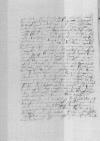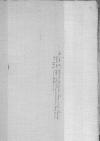Nach dem ... illegible⌈...... illegible⌉ es unser bruder probably Georg von Höfen (Georg Flachsbinder, Georgius de Curiis) (†after 1550-02-07), Ioannes Dantiscus' brother; Starosta of Rössel (HARTMANN 1525-1550, No. 584, 586, 588; AGAD, MK, 77, f. 385-386v)⌊Georgprobably Georg von Höfen (Georg Flachsbinder, Georgius de Curiis) (†after 1550-02-07), Ioannes Dantiscus' brother; Starosta of Rössel (HARTMANN 1525-1550, No. 584, 586, 588; AGAD, MK, 77, f. 385-386v)⌋ mit E(wer) H(erlichkei)t hatt vorlassenn(n), / yst unser freuntlich bytt, daß E(wer) H(erlichkei)t mit pranger ditz briveß das pferdt und den reytstandt, / auch dy huthe mit den ersten wolde her schickenn(n), / und so das pferdt nicht thuchtig und noch kranck wer(e), / byt wir, / das E(wer) H(erlichkei)t ein andres illegible⌈[s]s illegible⌉ in dy stadt kauff, ader selbest dar gebe, in dem allen unß wylferig sein. / Das illegible⌈[as]as illegible⌉ wollen wir mit erstatung E(wer) H(erlichkei)t darlege, uns dyselbtige freuntlichen zu beschulden alwege wyllig befundenn(n) werdenn. / Hymit Gott in aller wolfhart befolhenn(n).
 APG 300, 53, 267 p.3
APG 300, 53, 267 p.3
Ich hab E(wer) H(erlichkei)t rechenschafft ubersehen was die III pferde vor III-C und LIX ... illegible⌈...... illegible⌉III ... illegible⌈...... illegible⌉ gross belanget, und unders das E(wer) H(erlichkei)t vor mich ausgegeben(n), / do von sibenhundert ... illegible⌈...... illegible⌉ zu gutter(r) rechenschafft / von den(n) friedrichs g(roschen) und funfczyg ... illegible⌈...... illegible⌉ klein, die E(wer) H(erlichkei)t von Gdańsk Town Council ⌊eym ersam rotheGdańsk Town Council ⌋ entfangen(n), / abgeczogen(n). / Alles, das ubrig wirt bleibn(n), / sol in meine(m) abwesen(n), / so ich biss freitag von(n) hinnenn(n) mus, mein bruder Bernhard von Höfen (Bernhard Flachsbinder) (†after 1548), Ioannes Dantiscus' brother, stayed with Dantiscus in Spain, as a member of his mission's retinue, and was used as a trusted courier to Poland at least from 1526; after 1530 Starost of Löbau⌊BerntBernhard von Höfen (Bernhard Flachsbinder) (†after 1548), Ioannes Dantiscus' brother, stayed with Dantiscus in Spain, as a member of his mission's retinue, and was used as a trusted courier to Poland at least from 1526; after 1530 Starost of Löbau⌋ zcaln(n) und ausricht(en). / Heth ich nun meynen(n) grossn(n) schecken, den ich gern(n) E(wer) H(erlichkei)t gegebn(n) und geschenkt illegible⌈[kt]kt illegible⌉, so die Sigismund II Augustus Jagiellon (Zygmunt II August) (*1520 – †1572), 1529-1572 Grand Duke of Lithuania (ruled from 1544); 1530-1572 King of Poland (crowned vivente rege (ruled from 1548, after the death of his father); son of Sigismund I Jagiellon and Bona Sforza⌊junge ko(niglich)e m(ajeste)tSigismund II Augustus Jagiellon (Zygmunt II August) (*1520 – †1572), 1529-1572 Grand Duke of Lithuania (ruled from 1544); 1530-1572 King of Poland (crowned vivente rege (ruled from 1548, after the death of his father); son of Sigismund I Jagiellon and Bona Sforza⌋ solcher pferde begert, / kuem mir iczunder wol zu passe. / Doch wen ich gen(n) Cracow (Kraków, Cracovia), city in southern Poland, Małopolska, on the Vistula river, from 1038 capital of the Kingdom of Poland⌊KrakoCracow (Kraków, Cracovia), city in southern Poland, Małopolska, on the Vistula river, from 1038 capital of the Kingdom of Poland⌋ kom, / mag ir m(ajeste)t aus alln(n) meynen(n) pferd(en) auslesen(n) etc. Morg(en) uber acht tage wold ich gern(n) sein zu Poznań (Posen, Posnania), city in west-central Poland, Wielkopolska, on the Warta river⌊PosenPoznań (Posen, Posnania), city in west-central Poland, Wielkopolska, on the Warta river⌋, / dan Ferdinand I of Habsburg (*1503 – †1564), from 1521 Archduke of Austria, from 1526 King of Bohemia and Hungary, Croatia and Slavonia as Ferdinand I, 1531-1558 King of the Romans, 1558-1564 Holy Roman Emperor; son of Philip I the Handsome and Joanna the Mad of Castile, a younger brother of Charles V of Habsburg⌊ro(misch)e ko(niglich)e m(ajeste)tFerdinand I of Habsburg (*1503 – †1564), from 1521 Archduke of Austria, from 1526 King of Bohemia and Hungary, Croatia and Slavonia as Ferdinand I, 1531-1558 King of the Romans, 1558-1564 Holy Roman Emperor; son of Philip I the Handsome and Joanna the Mad of Castile, a younger brother of Charles V of Habsburg⌋ wirt den tag zu Wrocław (Breslau, Vratislavia), city in southwestern Poland, on the Oder river, historical capital of Silesia, from 1526 ruled by the Habsburgs⌊BreslauWrocław (Breslau, Vratislavia), city in southwestern Poland, on the Oder river, historical capital of Silesia, from 1526 ruled by the Habsburgs⌋ einzcyhen(n), / und kan do wie mir heutiges tags durch ein kemorer ko(nigliche)r m(ajeste)t cf. Sigismund I Jagiellon to Ioannes DANTISCUS Cracow, 1538-05-17, CIDTC IDL 5692⌊geschriben(n)cf. Sigismund I Jagiellon to Ioannes DANTISCUS Cracow, 1538-05-17, CIDTC IDL 5692⌋, / do nicht lange wartn(n), / der weg(en) ich eylen(n) mues. / Mir ist zugeben(n) vor ein collega der her woywod von(n) Poznań (Posen, Posnania), city in west-central Poland, Wielkopolska, on the Warta river⌊PosenPoznań (Posen, Posnania), city in west-central Poland, Wielkopolska, on the Warta river⌋, Janusz Latalski (†1557), brother of Jan Latalski, Archbishop of Gniezno; 1520-1529 Castellan of Ląd; 1529-1535 Castellan of Gniezno; 1535-1538 Voivode of Inowrocław; 1538-1557 Voivode of Poznań (PSB 16, p. 563; Urzędnicy 1/2, p. 211)⌊LatalskiJanusz Latalski (†1557), brother of Jan Latalski, Archbishop of Gniezno; 1520-1529 Castellan of Ląd; 1529-1535 Castellan of Gniezno; 1535-1538 Voivode of Inowrocław; 1538-1557 Voivode of Poznań (PSB 16, p. 563; Urzędnicy 1/2, p. 211)⌋, / den ich zu Posen werd finden(n). / Der gestalt und so eylents mues ich mich uff den weg machn(n), / und wil E(wer) H(erlichkei)t sachen noch irem(m) beger(en) an beyder Sigismund I Jagiellon (Zygmunt I) (*1467 – †1548), King of Poland and Grand Duke of Lithuania (1506-1548); Duke of Głogów (Glogau) (1499-1506), Duke of Opava (1501-1506), Governor of Silesia (1504-1506); son of King Kazimierz IV Jagiellon and Elisabeth of Austria
Sigismund II Augustus Jagiellon (Zygmunt II August) (*1520 – †1572), 1529-1572 Grand Duke of Lithuania (ruled from 1544); 1530-1572 King of Poland (crowned vivente rege (ruled from 1548, after the death of his father); son of Sigismund I Jagiellon and Bona Sforza⌊ko(nigliche)n m(aies)t(ete)nSigismund I Jagiellon (Zygmunt I) (*1467 – †1548), King of Poland and Grand Duke of Lithuania (1506-1548); Duke of Głogów (Glogau) (1499-1506), Duke of Opava (1501-1506), Governor of Silesia (1504-1506); son of King Kazimierz IV Jagiellon and Elisabeth of Austria
Sigismund II Augustus Jagiellon (Zygmunt II August) (*1520 – †1572), 1529-1572 Grand Duke of Lithuania (ruled from 1544); 1530-1572 King of Poland (crowned vivente rege (ruled from 1548, after the death of his father); son of Sigismund I Jagiellon and Bona Sforza⌋ hove nicht vorgessen(n). / Hiemit Got befolen(n) etc.
Och besorg, / so mir die zceit so korcz felt, / das E(wer) H(erlichkei)t das pfert nicht wirt mugen(n) schick(en). / Wer aber sunst ein gut stark klepper, daruff der reit smith(?) gen Thorn (Toruń, Thorunium), city in northern Poland, on the Vistula river in its lower reaches, main residence of the bishops of Kulm (Chełmno); one of the three Great Prussian Cities (along with Gdańsk and Elbing) which had representatives in the Council of Royal Prussia; a member of the Hanseatic League⌊Thorn(n)Thorn (Toruń, Thorunium), city in northern Poland, on the Vistula river in its lower reaches, main residence of the bishops of Kulm (Chełmno); one of the three Great Prussian Cities (along with Gdańsk and Elbing) which had representatives in the Council of Royal Prussia; a member of the Hanseatic League⌋ zu mir kuem, / dan(n) bit ich zu kowffen(n), / und alles, was E(wer) H(erlichkei)t vor mich ausgeben(n), schrifftlich mich lossen wissen(n). / Sol E(wer) H(erlichkei)t zu danck wider werd(en) etc.




 APG 300, 53, 267 p.8
APG 300, 53, 267 p.8